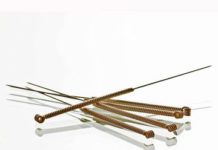 “A new study has shown that the cells of women who’ve had multiple pregnancies age faster than women who’ve had no pregnancies. Weekend Images Inc.
“A new study has shown that the cells of women who’ve had multiple pregnancies age faster than women who’ve had no pregnancies. Weekend Images Inc.
Hey young moms, if you’re feeling older today than ever, it might not only be just because your three kids have chosen this day to vie for the title of Most Annoying Siblings in the World. According to a study published in late July in the journal Scientific Reports, multiple pregnancies may make your cells age more quickly. Oh great.
Researchers at both the University of Washington and Northwestern University studied women between the ages of 20 and 22 in the Philippines. They looked at two specific markers of age: telomere length and epigenetic age. Telomeres are little caps on the ends of our chromosomes, kind of like the bit at the end of a shoelace that keeps it from fraying. Over time, telomeres get shorter, and the aging process begins. Epigenetic age is a measure of changes to DNA at certain points along the genome.
"Telomere length and epigenetic age are cellular markers that independently predict mortality, and both appeared ‘older’ in women who had more pregnancies in their reproductive histories," Calen Ryan, lead author of the study, said in a press release.
But while women are pregnant, the researchers were surprised to find, their cells actually appear younger than their chronological age. All the same, when women had multiple pregnancies, their cells began to appear older — from about 6 months to 2 years older for each pregnancy.
Historical records have long shown that women who had more children lived shorter lives and were susceptible to different diseases than women who have fewer children. As it turns out, it’s not the horrible behavior of their kids that does women in.
Another study published in March 2018 by researchers from George Mason University found that the telomeres of women who had borne children were shorter than women who had not. The telomeres in the mothers appeared to be the equivalent of 11 years shorter.
Neither of these studies has yet concluded why this would be. Researchers from Northwestern and the University of Washington are already working on a follow-up to the latest study to learn more. They’re back in the Philippines to take further measurements from the same women who were first studied in 2005.
There’s no word on if the researchers will be studying if the children did in fact give their mothers gray hair, wrinkles or eyes in the backs of their heads.
NOW THAT’S A RELIEF
The George Mason Study in particular pointed out that there are lots of things that shorten telomeres — smoking, obesity, and just getting older. OK, maybe none of those are particularly great, health-wise. But some researchers think that, just as with smoking and obesity, we have some control over the aging effects of pregnancy as long as women eat well, exercise, get enough sleep, and … we hear you laughing, moms. We’ll stop now.































